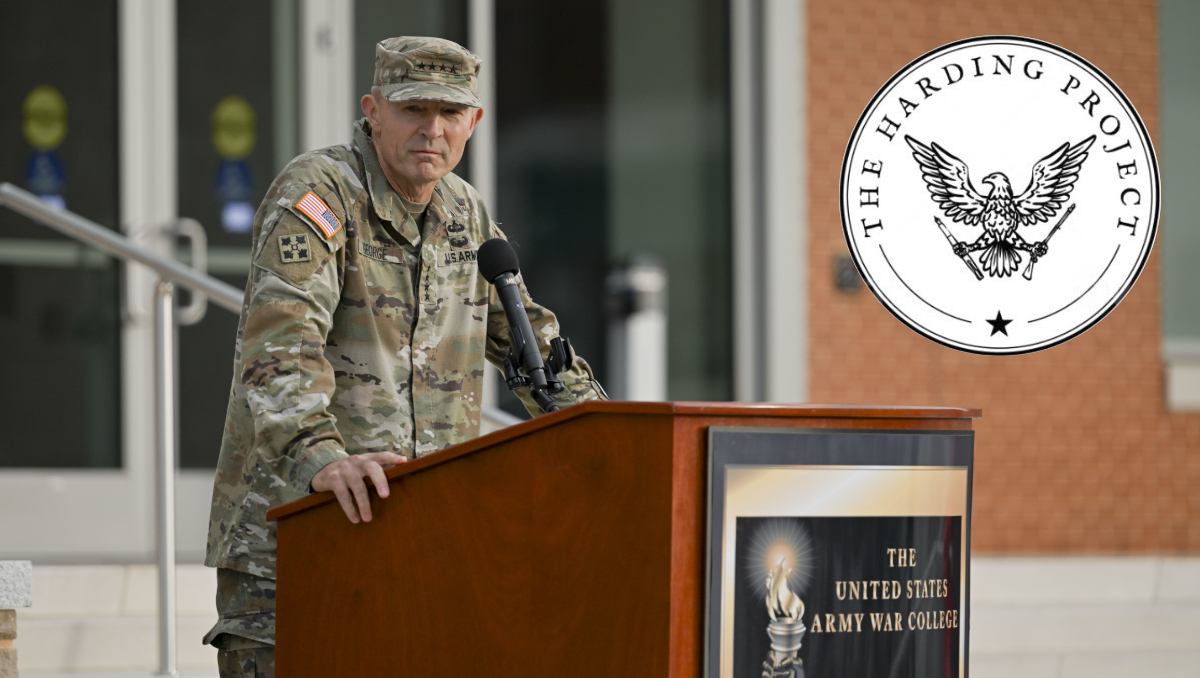
Friend of the podcast, Zach Griffiths, recently reached out with an exciting opportunity and we’re happy to help publicize it. Zach, who serves as the Director of the Harding Project, a Chief of Staff of the Army initiative to revitalize professional military writing, shared details about the brand-new Harding Fellowship. This program is designed to equip Army leaders to shape professional discourse by enabling them to earn a graduate degree while editing their branch journal. The program is open to Captains, Master Sergeants, and CW4s from select branches. Applications for the fellowship will open this summer, and further information can be found at www.lineofdeparture.army.mil/Harding.
To help kick off the effort we’re re-releasing this and one other podcast episodes highlighting the creation and value of the Harding Project.
It’s time to talk about the Harding Project once again. The project is the Chief of Staff of the Army’s (CSA) effort to renew professional publications, strengthen the profession, and ultimately enhance the warfighting capability of the U.S. Army. Jake Larkowich, Deputy Commandant of the U.S. Army War College and associate editor for War Room, stepped into the studio to share a senior leader perspective. He joins Editor-in-Chief, JP Clark, to discuss the importance of putting words to your thoughts. Their conversation focuses on sharing experiences and opinions in writing at the senior leader level, where there is value for both junior officers and NCOs, as well as challenges and benefits to writing for one’s contemporaries.
Professional writing is a way to overcome the tyranny of distance and share those ideas outside of that closed circle that you exist in on a day-to-day basis.
The podcast episode JP references with Zach Griffiths and Theo Lipsky can be found here. The article written by COL Larkowich and then COL Buzzard was titled What Should the Brigade Be Doing Right Now? Deconstructing the ‘Brigade Fight’.
Podcast: Download
Subscribe: Apple Podcasts | Spotify | Amazon Music | Android | Pandora | iHeartRadio | Blubrry | Podchaser | Podcast Index | TuneIn | Deezer | Youtube Music | RSS | Subscribe to A Better Peace: The War Room Podcast
Jake Larkowich is a colonel in the U.S. Army and serves as the Deputy Commandant of the U.S. Army War College. In his immediate prior assignment, he served as the Director of the Center for Strategic Leadership within the College. Colonel Larkowich previously served as the Commander of the 188th Infantry Brigade in First Army Division East at Fort Stewart, Georgia, providing training and validation to Army National Guard and Reserve Component units across the Southeastern United States.
JP Clark is an associate professor of military strategy teaching in the Basic Strategic Art Program. He served in the army for twenty-six years as an armor officer and strategist. He holds a Ph.D. and M.A. in history from Duke University, an M.S.S. from the Army War College, and a B.S. in Russian and German from West Point. He is the author of Preparing for War: The Emergence of the Modern U.S. Army, 1815-1917 (Harvard, 2017). He is currently working on a history of U.S. military strategy in the Pacific from 1898 to 1941 that is under contract with the University Press of Kansas. He is the 3rd Editor-in-Chief of War Room.
The views expressed in this presentation are those of the speakers and do not necessarily reflect those of the U.S. Army War College, U.S. Army, or Department of Defense.
Photo Description: Chief of Staff of the Army, General Randy George, addresses the crowd at the ribbon-cutting ceremony for the new Root Hall at the U.S. Army War College, 25 October 2023.
Photo Credit: Courtesy of the U.S. Army War College flickr account.





Might a good example of professional military writing, and issues for which today’s professional military personnel might wish to write above now, might these be found, for example, by reflecting on these two excerpts from then-active duty GEN Joseph L. Votel, et.al’s “Unconventional Warfare in the Gray Zone”? (See Joint Force Quarterly, Issue 80, 1st quarter, January 2016.)
“The Gray Zone is characterized by intense political, economic, informational, and military competition more fervent in nature than normal steady-state diplomacy, yet short of conventional war. This is hardly new, however. The Cold War was a 45-year-long Gray Zone struggle in which the West succeeded in checking the spread of communism and ultimately witnessed the dissolution of the Soviet Union.”
“Advocates of UW first recognize that, among a population of self-determination seekers, human interest in liberty trumps loyalty to a self-serving dictatorship, that those who aspire to freedom can succeed in deposing corrupt or authoritarian rulers, and that unfortunate population groups can and often do seek alternatives to a life of fear, oppression, and injustice. Second, advocates believe that there is a valid role for the U.S. Government in encouraging and empowering these freedom seekers when doing so helps to secure U.S. national security interests.”
Herein, if GEN Votel, et. al., were writing today (only nine years later) might they suggest that:
a. In the contemporary Gray Zone struggle, between the U.S. and our adversaries, this has resulted now in our adversaries succeeding in checking the spread of, in this post-Cold War case, democracy, free trade, human rights, etc., and in the weaking of the U.S. and its alliances? And that:
b. The means by which we could successfully pursue unconventional warfare (etc., etc., etc.) in the Gray Zone in the recent past — to wit: via “a population of self-determination seekers, whose human interest in liberty trumps loyalty to a self-serving dictatorship, and where those who aspire to freedom can succeed in deposing corrupt or authoritarian rulers, and where unfortunate population groups can and often do seek alternatives to a life of fear, oppression, and injustice” — this means may no longer be available?
Herein, would not every military journal — and the writers wishing to try their hands there — would not both of these benefit from a formal consideration of the — exceptionally new and novel — challenges that I describe in my “a” and “b” immediately above?
Much like GEN Joseph Votel, et. al — who wrote about unconventional warfare only 9 years ago in Joint Force Quarterly — likewise did LTG Charles Cleveland, and his co-author, write an article about irregular warfare (in this latter case, only 5 years ago) in a Rand item entitled “The American Way of Irregular War: An Analytical Memoir.” Here are couple of excerpts from LTG Cleveland’s such article:
“In the same way that the conventionally focused American way of war is defined by America’s technical and industrial capacity and technological edge, the American way of irregular war is tied to our notions of religious pluralism, democracy, and, above all, human rights. And although the American way of war protects us against near-peer powers and guarantees the lanes of global commerce, the American way of irregular war protects our way of life by both promoting our worldview and giving people the tools to realize the same opportunities that we have had. … ” (See last paragraph of Page 5 of the Introduction chapter to the Rand paper, that I identify above.)
“The Achilles’ heel of our authoritarian adversaries is their inherent fear of their own people; the United States must be ready to capitalize on this fear. … An American way of irregular war will reflect who we are as a people, our diversity, our moral code, and our undying belief in freedom and giving people the tools to realize the same opportunities that we have had.” (See the “Conclusion” of the Rand paper, that I identify above.)
Thus, to ask (much as I did with GEN Votel and re: his unconventional warfare article in my initial comment above): If LTG Cleveland and his co-author were writing about irregular warfare today (just 5 years later), might they suggest that:
a. In our current time, and due to current circumstances,
b. The U.S. may no longer have the ability to pursue such things as irregular warfare; this, via such things as the attributes/the means that LTG Cleveland points to above? (To wit: via “our religious pluralism, democracy and, above all, human rights,” and “who we are as a people, our diversity, our moral code and our undying belief in freedom” and “giving people the tools to realize the same opportunities that we have had”?)
In this regard, are these not incredibly timely and serious observations — deserving equally timely and serious discussions — not just in our unconventional and/or irregular warfare journals — but, indeed, in many if not all of our military publications? (As yet another example, in our intel publications, addressing such things whether we still have human intelligence gathering capabilities — in these new and novel times — when America must look so very different to the other people in the world, than it did just a few years ago?)